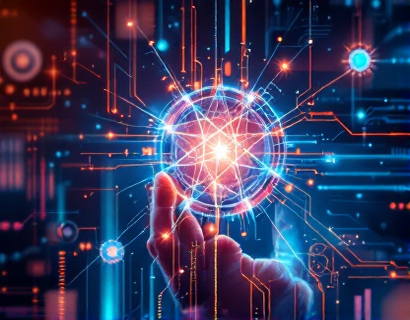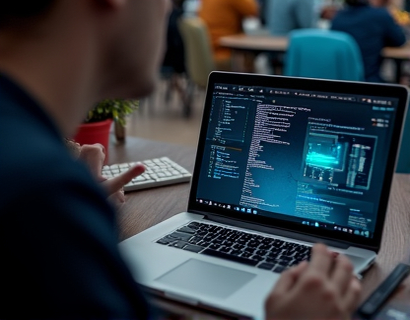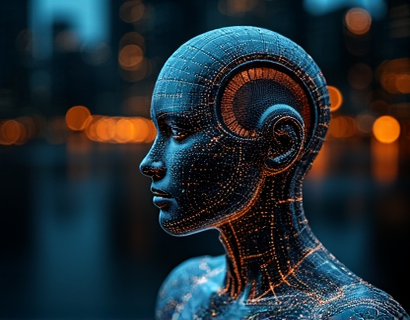Revolutionizing Digital Engagement: The Synergy of Crypto and AI in the Modern Tech Ecosystem
The intersection of cryptocurrency and artificial intelligence (AI) is ushering in a new era of digital transformation, fundamentally altering how we interact with technology and each other. This fusion is not just about combining two advanced technologies but about creating a synergistic effect that enhances connectivity, security, and user engagement across various digital platforms. As we delve into this topic, it's essential to understand the individual roles of crypto and AI before exploring their combined impact on the tech ecosystem.
Understanding Cryptocurrency
Cryptocurrency, often referred to as digital or virtual currency, uses cryptography for security and operates on a decentralized network, typically a blockchain. This decentralized nature means that no single entity has control over the entire network, making transactions transparent, secure, and resistant to censorship. The most well-known cryptocurrency, Bitcoin, was launched in 2009 by an unknown person or group using the pseudonym Satoshi Nakamoto. Since then, thousands of alternative cryptocurrencies, or altcoins, have emerged, each with unique features and use cases.
One of the key features of cryptocurrency is its ability to facilitate peer-to-peer transactions without the need for intermediaries like banks. This not only reduces transaction costs but also speeds up the process. The underlying blockchain technology ensures that all transactions are recorded in a tamper-proof ledger, enhancing trust and reliability. Beyond financial transactions, cryptocurrencies are being explored for their potential in various sectors, including supply chain management, voting systems, and identity verification.
Exploring Artificial Intelligence
Artificial intelligence, on the other hand, refers to the simulation of human intelligence processes by machines, particularly computer systems. These processes include learning (the acquisition of information and rules for using it), reasoning (using rules to reach approximate or definite conclusions), and self-correction. AI encompasses various subfields, such as machine learning, natural language processing, computer vision, and robotics. The rapid advancements in AI have led to significant improvements in efficiency, accuracy, and decision-making across industries.
Machine learning, a subset of AI, involves the development of algorithms that allow computers to learn from and make predictions based on data. Supervised learning, unsupervised learning, and reinforcement learning are key techniques used in machine learning. These methods enable AI systems to improve over time without being explicitly programmed for each task. Natural language processing (NLP) allows machines to understand, interpret, and generate human language, while computer vision enables them to interpret and make decisions based on visual data.
Synergy Between Crypto and AI
The combination of cryptocurrency and AI creates a powerful toolkit for innovation, particularly in the realm of digital engagement. By leveraging the security and transparency of blockchain technology, AI systems can operate with enhanced trust and efficiency. Conversely, AI can optimize various aspects of cryptocurrency networks, from transaction processing to security measures. This synergy is driving the development of advanced solutions that redefine user experiences and business models in the digital space.
One of the most significant applications of this synergy is in the creation of decentralized applications (dApps). dApps run on blockchain networks and utilize smart contracts, which are self-executing contracts with the terms of the agreement directly written into code. AI can enhance dApps by providing intelligent automation, personalized user experiences, and predictive analytics. For instance, AI-driven recommendation systems can suggest relevant services or products to users based on their behavior and preferences, increasing engagement and satisfaction.
Enhancing Security with AI
Security is a paramount concern in the crypto space, and AI plays a crucial role in fortifying blockchain networks against threats. Machine learning algorithms can detect and mitigate fraudulent activities, such as phishing attacks and smart contract vulnerabilities, by analyzing patterns and anomalies in transaction data. AI-powered security solutions can adapt to new threats in real-time, providing a dynamic and robust defense mechanism. This not only protects user assets but also builds confidence in the use of cryptocurrency and blockchain-based services.
Moreover, AI can enhance the privacy of transactions through advanced encryption techniques and zero-knowledge proofs. These methods allow users to verify the validity of transactions without revealing sensitive information, maintaining confidentiality while ensuring transparency. This balance between security and privacy is essential for the widespread adoption of crypto technologies.
Optimizing User Engagement through AI
AI-driven analytics and insights can significantly improve user engagement on digital platforms. By analyzing user data, AI can identify trends, preferences, and behaviors, enabling the creation of tailored experiences that resonate with individual users. Personalization is a key factor in keeping users engaged and loyal to a platform. For example, AI can curate content feeds, recommend products, and optimize user interfaces based on real-time data, ensuring that users have a seamless and relevant experience.
Chatbots and virtual assistants powered by AI can provide 24/7 customer support, answering queries and resolving issues promptly. These AI-driven interfaces not only enhance user satisfaction but also reduce operational costs for businesses. In the context of cryptocurrency and dApps, AI-powered chatbots can guide users through complex processes, such as setting up wallets, executing transactions, and managing assets, making the experience more accessible and user-friendly.
Innovative Solutions in the Digital Ecosystem
The integration of AI and crypto is giving rise to innovative solutions that are transforming various aspects of the digital ecosystem. One such area is decentralized finance (DeFi), which aims to create financial systems that are open, transparent, and accessible to everyone. AI can optimize DeFi protocols by predicting market trends, managing risks, and automating trading strategies. This not only enhances the efficiency of financial operations but also opens up new opportunities for investors and users.
Another promising application is in the field of digital identity management. Blockchain-based identity solutions combined with AI can provide secure, decentralized, and self-sovereign identity systems. Users can control their personal data and decide who has access to it, enhancing privacy and reducing the risk of identity theft. AI can further enhance these systems by verifying identities through biometric data and behavioral patterns, adding an extra layer of security.
Enhancing Connectivity and Interoperability
Interoperability is a critical challenge in the crypto space, as different blockchain networks often operate in silos. AI can play a pivotal role in bridging these gaps by developing smart middleware that facilitates seamless communication and data exchange between disparate systems. This interoperability is essential for building a cohesive and interconnected digital ecosystem where users can interact and transact across multiple platforms without friction.
Furthermore, AI can optimize network performance by predicting and managing congestion, ensuring that transactions are processed efficiently and quickly. This is particularly important for applications that require real-time data, such as supply chain tracking or financial trading. By leveraging AI for network optimization, the overall user experience is enhanced, leading to higher adoption rates and broader usage of crypto and blockchain technologies.
Future Prospects and Challenges
The future of the crypto and AI convergence holds immense potential, but it also comes with challenges that need to be addressed. Regulatory frameworks are still evolving, and the lack of clear guidelines can hinder innovation and adoption. However, as more countries recognize the benefits of these technologies, we can expect more structured and supportive regulatory environments.
Another challenge is the scalability of blockchain networks. While blockchain offers many advantages, its current limitations in transaction throughput and processing speed need to be overcome. AI can assist in developing more efficient consensus mechanisms and optimizing network protocols to handle increased loads. Additionally, the energy consumption of some blockchain networks is a concern, and AI can help in designing more sustainable and eco-friendly solutions.
Looking ahead, the integration of AI and crypto is likely to expand into new domains, such as healthcare, education, and smart cities. In healthcare, AI-driven analytics on blockchain can secure patient data and enable seamless sharing of medical records, improving diagnostic accuracy and treatment outcomes. In education, decentralized platforms powered by AI can provide personalized learning experiences and secure credentialing systems. Smart cities can leverage these technologies to enhance public services, traffic management, and resource allocation.
In conclusion, the fusion of cryptocurrency and AI is revolutionizing the digital landscape by enhancing security, personalization, and efficiency. As these technologies continue to evolve, they will drive significant growth and innovation, shaping the future of the tech ecosystem. For tech-savvy individuals interested in crypto and AI, staying informed about these advancements is crucial for harnessing their full potential and contributing to the ongoing digital transformation.










































